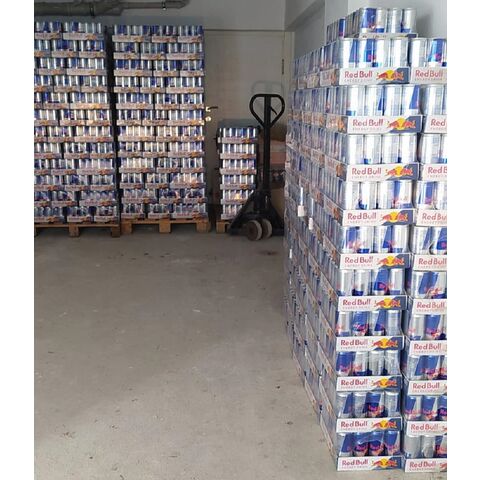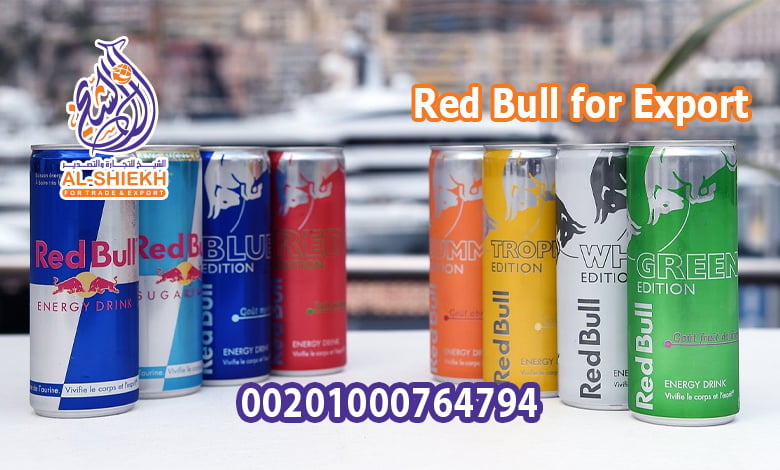Red Bull for Export – Red Bull Supplier
Introduction
In today’s global market, energy drinks have taken center stage, and one brand that stands out among them all is Red Bull. With its unique taste, brand identity, and energy-boosting properties, Red Bull has become a staple for individuals across various countries. For businesses in the export sector, “Red Bull for export” presents a lucrative opportunity. In this comprehensive guide, we will explore everything you need to know about exporting Red Bull, including pricing, shipping logistics, market demand, and tips to optimize your export strategy. Whether you’re a seasoned exporter or new to the business, this article will provide you with essential insights to succeed in the energy drink export market.
1. Understanding the Global Demand for Red Bull
Red Bull’s global popularity is undeniable, making it a highly sought-after product in international markets. The brand’s consistent marketing efforts and sponsorships in extreme sports have fueled its demand worldwide. Understanding this demand is crucial for any exporter. Countries like the United States, Germany, and Australia show high consumption rates, but emerging markets in Asia and Africa are also seeing a significant increase in Red Bull sales.

Red Bull for Export: Key Markets to Consider
When considering “Red Bull for export,” it’s essential to target markets with high demand and less market saturation. Countries with younger populations or those with a growing middle class are ideal targets. For instance, the Middle East and Southeast Asia are currently experiencing a surge in energy drink consumption, offering promising opportunities for exporters.
2. The Legal Framework for Exporting Red Bull
Exporting Red Bull, like any other product, requires compliance with the legal frameworks of both the exporting and importing countries. Regulations regarding food and beverage exports can vary significantly from one country to another. It’s vital to be aware of these laws to avoid legal pitfalls.
Navigating Export Regulations
To successfully export Red Bull, you must understand and comply with local food safety standards, labeling requirements, and tariff regulations. Different countries may have specific regulations concerning the caffeine content in energy drinks, which could impact your export strategy. Additionally, ensuring proper documentation, such as certificates of origin and quality control documents, is crucial for smooth customs clearance.
3. Pricing Strategy for Red Bull Export
Setting the right price for “Red Bull for export” is a balancing act that involves understanding your costs, the market demand, and competitive pricing. Price too high, and you might struggle to find buyers; price too low, and your margins could suffer.
Red Bull Pricing: An In-Depth Analysis
Based on recent data, the price per shrink wrap containing 24 Red Bull cans is $17.65, excluding shipping costs.
This price is a key factor in determining your profit margins when exporting in bulk.
For instance, when exporting 2,500 shrink wraps, the total cost of the products would be $44,125.

4. Shipping and Logistics for Red Bull Export
Efficient shipping and logistics are the backbone of a successful export business. When exporting a product like Red Bull, which has a relatively short shelf life compared to non-perishable goods, it’s essential to ensure timely and safe delivery to maintain product quality.
Red Bull 250 ML Supplier
Best Practices in Export Logistics
Choosing the right shipping method—whether by air, sea, or land—depends on factors like destination, cost, and time sensitivity. For instance, shipping by sea is cost-effective for bulk orders but takes longer, which could be a downside for markets requiring quick replenishments. On the other hand, air freight, though more expensive, ensures faster delivery, preserving the product’s quality. Partnering with reliable logistics providers and understanding the specifics of shipping routes and customs processes will streamline your export operations.
5. Marketing Strategies for Red Bull Export
Marketing is key to penetrating new markets and increasing the sales volume of Red Bull in foreign countries. A well-planned marketing strategy will resonate with the target audience and enhance brand visibility.
Tailoring Marketing Campaigns to Local Markets
Understanding local cultures and consumer behavior is essential when marketing “Red Bull for export.” A strategy that works in Europe might not be as effective in Asia or South America. Localizing your marketing campaigns by incorporating cultural elements, language preferences, and even local influencers can make a significant impact. Additionally, leveraging digital marketing channels such as social media, search engine marketing, and email campaigns will help in reaching a wider audience.
6. Managing Risks in Red Bull Export
Exporting comes with its own set of risks, from fluctuating exchange rates to political instability in the target market. Identifying and managing these risks will safeguard your business and ensure long-term success.
Mitigating Export Risks
To manage risks effectively, it’s important to have contingency plans in place. Currency fluctuations can significantly impact profit margins, so using financial instruments like forward contracts can lock in exchange rates and protect your profits. Political risks can be mitigated by diversifying markets and avoiding over-reliance on a single region. Furthermore, investing in export insurance can protect against non-payment or other unforeseen issues.
7. Building Long-term Relationships in Exporting Red Bull
Building and maintaining strong relationships with distributors, retailers, and customers in your target market is essential for the sustainability of your export business. Long-term partnerships can lead to better market insights, more favorable terms, and a stable revenue stream.
Best Practices for Relationship Management
Effective communication, reliability, and understanding the needs of your partners are the cornerstones of strong business relationships. Regular visits, attending industry events, and keeping abreast of market trends will help in nurturing these relationships. Additionally, offering incentives, such as volume discounts or extended payment terms, can strengthen your position as a preferred supplier.

Supplying Red Bull: Meeting Local and International Market Needs
At Al-Shiekh Trade & Export, we pride ourselves on being one of the largest and most reliable suppliers and exporters of Red Bull in the market. Our extensive experience in the beverage industry has positioned us as a trusted partner for businesses looking to source Red Bull on a large scale, whether for local distribution or international markets.
Our commitment to quality and customer satisfaction sets us apart from other suppliers. We understand that Red Bull is not just a product; it’s a globally recognized brand with a strong market demand. This is why we ensure that every batch of Red Bull we supply meets the highest standards of freshness and authenticity. Our rigorous quality control processes guarantee that our customers receive genuine Red Bull products that meet their expectations, every time.
As a leading exporter, we have developed a robust logistics network that allows us to efficiently manage the supply chain from the manufacturer to your doorstep. Whether you’re based in a high-demand market or an emerging one, our global reach ensures that we can deliver Red Bull to you swiftly and securely. We handle all aspects of the export process, including compliance with international regulations and customs clearance, so that you can focus on growing your business.
Our scale and expertise allow us to offer competitive pricing, making us the preferred choice for businesses looking to procure Red Bull in bulk. We cater to a diverse range of clients, from wholesalers and retailers to event organizers and hospitality businesses, all of whom rely on us to meet their Red Bull supply needs.
When you choose Al-Shiekh Trade & Export as your Red Bull supplier, you’re partnering with a company that understands the intricacies of the beverage industry and is dedicated to helping you succeed in your market.
Conclusion
Exporting Red Bull presents a significant business opportunity in today’s global market. By understanding the demand, navigating the legal landscape, setting the right price, ensuring efficient logistics, and implementing effective marketing strategies, your business can thrive in the competitive energy drink export market. Moreover, managing risks and building strong relationships with market stakeholders will pave the way for long-term success. As you venture into the “Red Bull for export” market, keeping these fundamentals in mind will guide you toward profitability and growth.

Red Bull 250 ML Supplier
Contact Us
For more information or to place an order, please Send us E-mail : [email protected]
- Website: exportglobal-alshiekh.com
- Email: [email protected]
- Facebook: Al Shiekh on Facebook
- Instagram: Al Shiekh on Instagram
